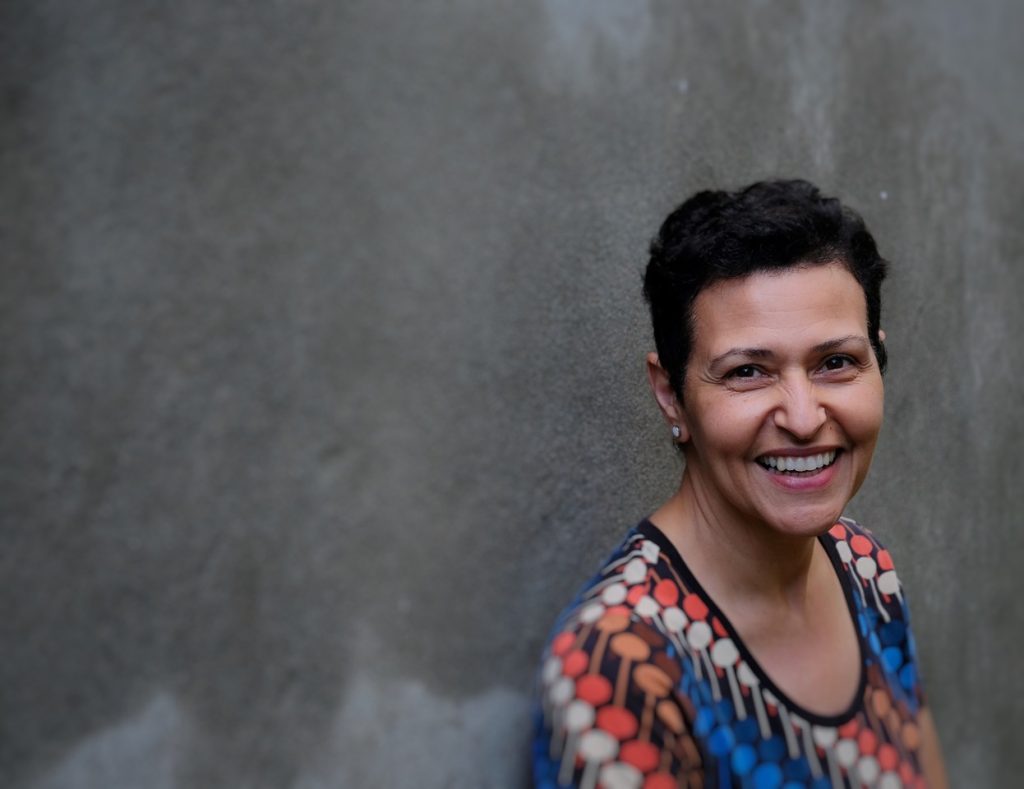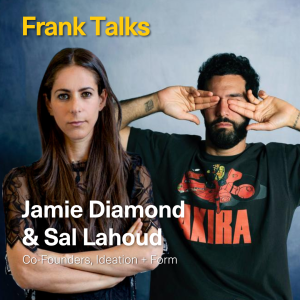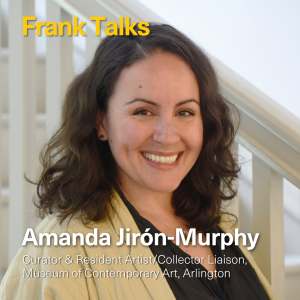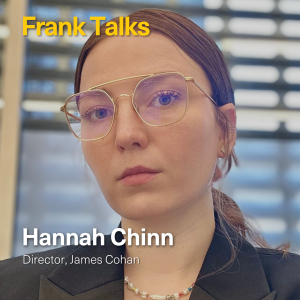This week’s Frank Talk is with Grace Sebeh Byrne, Founder and Executive Director of Yellow Pad Sessions! Born in Egypt, raised in Montreal, Grace lived and worked in Germany, New York City, Los Angeles and now resides back in her hometown of Montreal. Grace (née Graziella) has had a colourful and non-linear journey. The pursuit of adventure and the unpredictable was once a driving force in her wanderlust. Today, she errs on the side of routine, structure, stability, and meditative peace of mind. Except of course, when life throws her a curveball, like the current pandemic. Then, ‘thinking outside the box’ and resilience are skills Grace relies on to sustain her professional and private life. After careers in film and television production and health care, she’s now into career number three. She is the founder and executive director of an arts and culture non-profit called Yellow Pad Sessions. Its mission is to create events and promote artists whose ethos lie in the motto of Art For Social Change. An accomplishment Grace is proud of is bringing The United Nations Association Travelling Film Festival to Canada for the first time. The festival’s goal is to support the United Nations Sustainable Development Goals through the lens of documentary films and the stories that depict the human condition. Please enjoy Grace’s Frank Talk below!
What was your first job in the Arts?
I was a researcher for an entertainment TV show in Germany. I found a young boy, 10 years old, who owned an alligator as a pet, and we invited them on set. He walked in with the alligator on a leash and the audience loved it. It was all rather bizarre and humorous for me.
What was the most useful or important thing you learned at that job?
Know your target audience very well.
Tell us a little more about yourself. When did you realize you wanted to pursue a career in this industry?
I’ve always loved the arts and realized early on that it was a powerful tool of expression and in evoking emotions. I didn’t know exactly how I could be part of this field, but this belief was a strong driving force to get involved in some capacity. I did a fair bit of exploring at first: researching, planning, coordinating, painting, paper arts etc.… but eventually, I realized that I was better suited for behind-the-scenes work. My forté lay in the broader visions found in curatorial approaches or event creation. I have always been naturally drawn to themes of social justice, perhaps because my own experiences as an immigrant led me to question classes, acceptance, assimilation and cultural barriers. Now I’ve been able to merge these two interests.
What do you do now?
I am the founder and executive director of an arts and culture organization called Yellow Pad Sessions. Our mission is to offer art events and projects that bring forth reflection, discourse and compassion. We are deeply passionate about our vision of Art for Social Change.
Where are you from?
I live in Montreal, Canada, but I was born in Cairo, Egypt. I also lived in Germany and the United States.
What is the arts community like there?
The Montreal scene is very vibrant and quite competitive. Montreal audiences are very fortunate actually, as we receive an array of very talented and international artists and performers throughout the year. There is a lot of funding and support as the province puts a great deal of emphasis on the arts and tourism. There are over hundreds of festivals and art events in Quebec and over 175 museums, galleries, art institutions and artist-run centres. Blockbuster events are a staple to a short summer life due to our long winters, including our Jazz Festival, Just for Laughs, circus arts, film festivals and the list goes on. The joie-de-vivre spirit is integral to the fabric of Montreal culture and even in the harshest coldest weather, at times, -20 Celsius, you’ll still see a packed house at the theatres, music venues and museums. We are hardy folk. Maybe it’s all that hockey culture. LOL!
Has where you come from shaped what you do in the arts today?
Certainly. Since there are so many choices for Montreal audiences to choose from, it’s imperative to think of being unique and fresh. For instance, when we thought to bring The United Nations Association Film Festival to Montreal, we realized that it was the first of its kind in Canada and the only festival that supports the UN’s Sustainable Development Goals. (It’s been around for 22 years in California). Similar to Europe where art is part and parcel of everyday life, I grew up immersed in the arts in Montreal. It started with children’s theatre. And movies, not only coming from the North American market, but many coming from Europe, especially France since French is our first language here in Quebec. Expo 67 had a huge influence on me, even as a very young girl. Hosting an international world fair brought people and cultures from across the globe. There were many foreign visitors as a result, and many settled here. Montreal opened its doors to the world, and it became a cosmopolitan city soon thereafter. There is a great culinary arts scene too. The variety of restaurants is astounding.
What is the best piece of advice you can give about working in the art world?
Follow your passion and persevere. Also, speak to as many experts as you possibly can.
What is one of your greatest accomplishments in your career so far?
Starting my own non-profit. However, working at NBC News in Germany on the Berlin Wall story is up there too. That was pretty exceptional. It was thrilling to be part of history in the making.
What has been a challenge for you?
Getting funding.
What is something you do every day at the office (or your current home office)?
Tidy my desk and office space, make fresh delicious coffee and stop to meditate in the afternoon.
What is one of the weirdest things you have had to do on the job in your career?
This wasn’t so much weird as it was wild. I have found myself in a number of surreal situations with celebrities. While I was living and working in NYC, I had a roommate that was starstruck. He convinced me to accompany him to a few gala fundraisers at Radio City Music Hall. We would literally walk in through the kitchen, into the hall and find ourselves talking to celebrities. I spoke to the Golden Girls and Danny Aiello and even Calvert DeForest better known as Larry Bud Melman and a sidekick to David Letterman. Another time in Germany, I took part in an experimental scratch-film exhibition that preceded a performance by Debbie Harry. After the show, I attended the private party and we had an enlighten conversation together. She was so down to earth and kept asking me about myself. She was a huge example of how great artists are often very curious of other people’s experiences and how they keep learning from anybody. It taught me that being open and inquisitive opens up your mind.
What defines a good employee? What defines a good boss?
A good employee is someone who listens well, takes good notes, is self-motivated and is proactive in their work. I think a good boss listens well, is very organized and allows others to lead a project. This shows trust and helps to empower people. The work is more collaborative rather than flowing from the top down.
What do you think makes a person hirable?
A person who is truly passionate about the field in question. When you are passionate, you are motivated to understand the industry and know its ins and outs. When you start out, no one expects you to have the skills. But if you have the keen interest to learn and show that you’ve already done lots of research and even created your own projects, even if they are only ideas on paper, you become an asset.
What is your advice to making yourself stand out in your workplace? Any good tips for a giving a great interview?
In your workplace, showing that you think beyond the office is really helpful. For example, in the arts, attend as many screenings, plays, art shows, readings as possible. In other words, immerse yourself in it and see as much as you can, in all art forms. As for a great interview, smile, be true to yourself and show knowledge of the field. There’s no faking integrity and authenticity.
Is there any advice you would like to give people entering the art world?
Same as above, really. But don’t limit yourself to the arts only. Stay informed with what’s going on in current events too, as everything is connected. Whatever you do, don’t have a microscopic lens of the arts and limit yourself to your local city or country. See what’s going on globally in a variety of fields. You never know when you’ll be curating a show about medicine or CO2 emissions.
Any other anecdotes about your working experience that you would like to share?
I once worked with a very difficult person, and it was an important lesson for me. At the time, I didn’t have the maturity and EQ (emotional quotient) to know how to deal with them. I really struggled as this person was highly aggressive to their entourage and in our work environment. My greatest lesson from that situation was ultimately, to learn to be authentic, trust myself and gain more confidence in setting and communicating my boundaries. In hindsight, more than the issues that I had with that person, it taught me that I had a lot of places where I could grow. Practicing what I had learnt took lots of self-work and many years. But eventually, you learn that you are your best advocate for yourself and that self-respect is your greatest shield.
What is the best exhibition you have seen in the last year?
I must list two: Hilma af Klint and the David Bowie retrospective.
If you could own a work by 5 different artists, who would be in your collection?
Francis Bacon, Franz Kline, Ruth Asawa, Robert Motherwell, Hilma af Klint, and contemporary abstract artist, Heather Chontos.
What artwork is in your home office?
A collaborative work by Theresa Passerello and Victoria Leblanc.
What is your greatest WFH challenge? Or a WFH luxury you don’t want to lose ever again?
Sitting at my desk for so long and not being out and about is a big challenge for me. I used to see shows and have in-person meetings at least 3-4 times a week. I feel like right now I work in a void. A luxury I don’t ever want to lose is working from my garden. On sunny days, it’s a peaceful oasis.
How do you think art can play a fundamental role in the world’s recovery?
Art can be very cathartic for an artist as well as the viewer, so there’s that therapeutic benefit there. For the viewer, art can be especially touching and a powerful voice to our own feelings. I described this in my last newsletter, using art as a tool for protest has been around for many years. With our current socio-political volatility, such movements as Black Lives Matter have garnered a vivacious artistic response worldwide. Great art often comes from turbulent times and tempestuous emotions, whether individually or collectively.
How do you think art should be shared and/or experienced moving forward?
There’s no doubt that the digital arenas are a strong contender and will be part of our future. I believe we will increasingly experience art digitally, but in a more interactive way. VR, AR and XR are on the precipice of an emergence.
How has your current job adapted to the new virtual landscape? What do you think can be done better?
We are trying to adapt as best as possible but there’s no doubt we are on a learning curve. There’s nothing like an in-person experience; so, finding ways to stimulate interactivity in the digital ecosystem is vital to our existence.
What is your go to snack in quarantine? And your go-to soundtrack?
Coffee and buttered toast with a slice of aged gruyère. I don’t listen to music much right now…except for nature soundtracks and Tibetan bowls, lol.
Since we are all at home and exploring more galleries and museums online, perhaps some for the first time, when the quarantine is lifted, what is your first art filled destination?
A repertoire movie theatre or a contemporary dance show.
It can be argued that the art world is finally forced to adopt and adapt technologies that have long been a part of other industries. Agree or Disagree?
Agreed, but I don’t think it is being forced. Art, just like so many means of creative expression, naturally adapts as societies and artists evolve. The next generation of artists will work with what they’ve got, just as in prior generations. It is a natural progression as we all move forward.
And finally, do you think the art world should be more transparent?
Again, integrity and authenticity cannot be faked.
